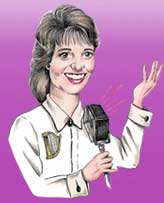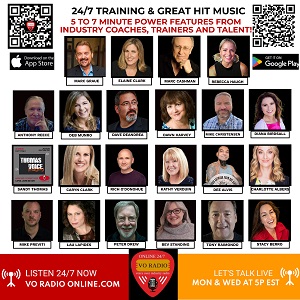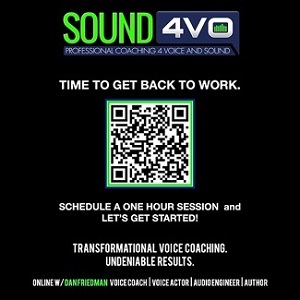|
Dancing With The Stars Pulsates
With 12 Lessons For Your VO Career
By Karen Commins Voice Actor
©2008 Karen Commins. All rights reserved
 You might think that the TV show, Dancing with the Stars (DWTS) has nothing to do with a voice-over career. If so, what I’m about to say may surprise you. You might think that the TV show, Dancing with the Stars (DWTS) has nothing to do with a voice-over career. If so, what I’m about to say may surprise you. When I first heard about this show, I confess that I thought the idea was dull and that the show would be cancelled. I never watched DWTS until Barry Manilow made a guest appearance. I admit that I quickly became hooked.
The show features celebrities from other endeavors who are paired with professional dancers. The dancers teach the celebs the complicated steps for ballroom and Latin dances, and three judges rate all of the performances.
While the thrilling live music, stunning costumes and amazing dance routines are appealing in themselves, I believe the show is widely popular for another reason: We have the opportunity to watch adults in a learning curve.
LEARN THESE STEPS
Learning something new as an adult is a different process than as a child. From watching this show, we can learn 12 valuable lessons that can be applied to a voice-over career:
1. You can't expect to excel at everything, especially on the first try.
As adults, we don't like to admit we don't know everything. When we're a star in one area of our lives, we take it for granted that we're a star in every area.
This show proves that you can accomplish on some level anything that you set out to do, especially when you relax, enjoy the process and forget about instant gratification.
If you also accept that it takes time, persistence and dedicated practice to become a star, you will be more likely to rise to that level.
2. You need to be patient with yourself when learning a new skill.
It's easy to become frustrated and discouraged when results seem slow in coming.
Whether you're learning to bring authentic interpretation to voice-over scripts, dance the paso doble (who even knew such a thing existed?) or do anything else, you have to remain focused and work through the discomfort of the training to accomplish your goal.
3. You may have natural ability, but a veteran instructor can help you improve and showcase your talent.
The celebs with musicality and rhythm are readily apparent to viewers. Even so, they differ in how fluidly they can execute the routine. The professional dancers create routines that maximize the celebs' abilities.
Voice actors are also judged on our fluidity in performing the script. An excellent voice-over coach can guide you to a style that honors, reflects and strengthens your natural vocal characteristics.
4. If you think or say you can't do it, you can't.
You have to maintain a positive attitude that you CAN do it. Your attitude is the most critical factor in determining your success at dancing, voice-over, sheep-herding and whatever else you may do in life.
Think of the power of your words as a self-fulfilling prophecy (which they are). Would you rather sit out on the dance and wonder if you could do it, or be fully alive and embracing the pain and pleasure of learning something new?
5. Confidence in your abilities grows with each step.
Viewers are taken behind-the-scenes as the competitors learn the dance for the upcoming week. We are able to see them struggle and fall (sometimes literally) while they are learning the routine.
We can see that the more they practice, the more comfortable and confident they become. Practice is the key to confidence, whether on the dance floor or in the voice-over booth.
6. Instruction and significant practice are needed in order to compete at a professional level.
Championship figure skater Kristi Yamaguchi is extremely athletic and has spent her life learning a routine choreographed to music. However, she admits that ballroom dancing is very different than ice skating, and she spends long hours learning the intricacies and emotions of the dance each week.
In voice-over, commercial scripts are different than narrative scripts, which require different skills than IVR scripts and audiobook projects.
Professional voice-over artists continue to study with coaches to improve technique and interpretation in their niche areas.
7. It doesn't matter how well you performed in practice. Your live performance is all that matters.
I've made several comments about practice. It's extremely important if you expect to become proficient and at some point master anything new!
ON DWTS, the celebrity dancers obviously improve with practice. Still, they only have one shot each week to win the judges' favor.
As a voice-over artist, we make an impression the moment we step in the booth. A director wants to hear a solid performance on that first live take.
When working at a studio, you can't have the attitude that re-takes are possible until mistakes are fixed. With the confidence from extended practice, your mistakes will be minor and few.
8. No matter how good you are, you can't take it personally if someone else is deemed better.
One couple gets eliminated on DWTS every week. A voice-over audition is the same way; only one person can win the prize.
The criteria and judging are entirely subjective, and the mathematical odds of winning any particular audition are definitely not in your favor!
You can't take it personally when you don't win auditions. If you keep practicing, submitting good auditions and putting yourself out there, some jobs will eventually be yours.
9. When you approach an activity with a sense of excitement and love, those attributes will be felt by your audience.
By the same token, the audience can sense anxiety and fear. The audience always wants the dancers to do well.
When the dancers start thinking about being judged, they make more mistakes. Their anxiety can cause their performance to seem wooden or mechanical.
Voice talent have the same performance issues. We allow the negative self-talk in our brains to disrupt our performance. By staying in the moment and concentrating on the feelings of love instead of doubt, we can give our audiences the performance that makes them cheer!
10. Just because it LOOKS easy doesn't mean that it is!
My husband doesn't like to dance; for some reason, he thinks he looks uncoordinated.
As we watch the show, I will ask him, "Doesn't that look like fun?" He always says, "No! It looks incredibly HARD!"
The professional dancers are the epitome of beauty and grace, but it has taken them years to reach their level of accomplishment.
Many people enter the voice-over field because they enjoy mimicking others, or they think that the voice-over artist is merely talking into the microphone. While they may have a good ear for sound, they are not experienced in performing scripts, much less with a smooth and original interpretation.
My observation is that the most successful voice talent have worked relentlessly by taking classes and hustling for jobs for 10 years or more before becoming an "overnight success."
11. Infuse your personality into your work for the most authentic and memorable results.
Comedian and DWTS cast member Adam Corolla will never be a professional dancer. However, he inserts his sense of humor into his routines. His creative approach camouflages some of the shortcomings in his technique.
I'm not encouraging you to do something to compensate for lack of technique.
However, the greatest attribute that you can bring to the table is yourself. No one else sees the world the way you do, and no one else sounds just like you.
The best readings are those when the voice artist can access and incorporate her or his own feelings in the script.
12. It's possible to do quality work and leave the world better than you found it.
Steve Guttenberg, who is one of the celebs on the show's 2008 spring season, keeps grinning ear-to-ear and gushing about the greatness of the show.
This show proves you don't need to use foul language or violence in order to create commercial success.
In my voice-over work, I won't perform a script if I don't like the words that I would be saying. I differ with those who think that it is merely acting to speak the words on the page. Your subconscious mind can't distinguish between pretend and real, so I refuse to voice scripts that are opposed to my own value system.
INSPIRING SHOW
I hope that after reading these 12 points learned from a TV show, you see that the success and creativity you observe in another field can inspire you to new heights in your voice-over career.
Karen Commins is a voice actor based in Atlanta specializing in narrations, podcasts and audiobooks. With two decades of experience as an information technology professional, she enjoys “rattling off the endless series of initials found in educational scripts written for high-tech audiences.” Her web site offers demos and photos of her Whisper Room soundproof studio, and she writes A Voice Above The Crowd, an insightful and entertaining blog about working and marketing oneself in the voice-over profession.
Web: www.KarenVoices.com
Blog: www.KarenBlogs.com
|
|
|
Tell Us What YOU Think!
Please Note: Since we check for spam, there will be a slight delay in the actual posting of your comment.
Comments
No comments have been posted yet. Hurry, and you could be the first!

.png)







click for new article alerts